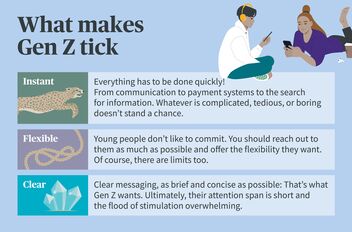
Understand Generation Z and benefit
Generation Z is growing up and gaining a foothold in the world of work. They have different expectations than the generations before them – and therefore present companies with unfamiliar challenges. How can young people be reached and satisfied today?
As “digital natives,” they have grown up with the Internet and smartphones and are envied for their IT skills. At the same time, Generation Z are accused of having little stamina, of being non-committal, and unfocused. But whether they are admired, ridiculed, or criticized, it is clear that they are shaking up our companies, questioning outdated working models, and introducing unfamiliar ideas. Those who know how to take advantage of this breath of fresh air will benefit.
Definition of Generation Z
Generation Z (born between 1995 and 2010) follows Generation Y (1980–1995, also known as “millennials”) and Generation X (1965–1980). The ranges of years should be interpreted generously: On the one hand, there are different definitions. On the other hand, the changeovers from one generation to the next are fluid – a model is always a simplification of the situation and only partially reflects reality. Roughly speaking, teenagers and young adults under the age of 30 are counted as Generation Z today. Of course, the characteristics attributed to a generation are merely tendencies and do not apply to all individuals.
Characteristics of Generation Z
Generation Z, or GenZ for short, is very aware of what is happening in the world around them: They are unsettled by world events and pessimistic about the future. Their need for security, stability, and independence, for example financially, is correspondingly great. A surprising number of them dream of owning their own home (source: swissinfo.ch). However, a fair salary alone is not enough to satisfy young employees: They want to live and work in line with their values.
Important trends for Generation Z
Despite their individual differences, certain developments can be observed in each generation – trends that characterize a striking number of people in this age group. Here are some examples for Generation Z:
- Diversity and inclusion. Generation Z appreciates diversity with regard to cultures, genders, sexual orientation, and backgrounds. Equality is a major issue for them.
- Environmental awareness. Many members of Generation Z show a strong interest in environmental issues. They are committed to nature conservation and prefer sustainable products and lifestyles.
- An affinity for technology. As digital natives, young adults value innovation and technology. They make intensive use of social media and digital platforms for communication and information.
- Social engagement. Generation Z is interested in social issues and is committed to justice and social change. Online activism and participation in social movements are common forms of expression.
- Flexibility and versatility. Due to the dynamic world they are growing up in, members of Generation Z are often flexible, adaptable, and open to versatility in their careers and journeys through life.
- Individuality and authenticity. Generation Z values uniqueness and self-expression. This is reflected in different lifestyles, fashion expressions, and an emphasis on personal identity. Those who are genuine and transparent earn respect.
- Health awareness A strong awareness of physical and mental health characterizes the values of Generation Z. Healthy nutrition, physical fitness, and mental wellness are all hot topics of discussion.
Job aspirations of Generation Z
“Love it, change it, or leave it”: Many employees of the younger generation live by this motto today. While the Baby Boomers lived to work and Generations X and Y worked to live, young adults today expect more from their jobs. Persevering in unpleasant situations and bending over backwards for the company – that's not Generation Z's cup of tea. Anyone who encounters adverse circumstances that cannot be changed simply moves on. After all, work should be fun and meaningful. A healthy work-life balance is also important to Generation Z: Why work a full-time job when you can get by on half the salary? Generation Z would rather have more freedom and free time, they say.
Employers are right to ask themselves: What do you have to offer to attract and retain promising employees?
Working conditions
Things that used to make a company stand out are increasingly being taken for granted:
- Fringe benefits – good social benefits, perks, employee discounts, etc.
- Flexible working – part-time, home office, job sharing, unpaid leave, etc.
- Corporate culture – supportive atmosphere, constructive feedback, flat hierarchies, etc.
Career development
Personal and professional growth is very important to Generation Z. They want:
- Promotion opportunities – clear and transparent career paths, recognition of their achievements
- Opportunities for continuing education – training programs and courses, time and/or financial support
- Mentoring – interest in their own person, individual support from more experienced employees
What does FOBO mean?
FOBO stands for fear of better options. But FOBO is actually about the fear of making decisions: “If I commit myself now, I might miss out on something even better.” That's why you want to keep all your options open – for as long as possible.
In its most pronounced form, FOBO can have a paralyzing effect. Many young people are familiar with this. A lack of commitment is also something that is often attributed to Generation Z.
Purpose
Many young people aspire to have a job in a company that reflects their own values and convictions:
- Mission – a goal worth working for (to make the world a better place)
- Responsibility – an undertaking for the good of society and the environment
- Meaning – needed and taken seriously, can make a difference
Young employees bring fresh ideas, dynamism and innovation to the world of work. Above all, however, they have their finger on the pulse of their generation – and are therefore also your key to unlocking young people and young adults as a target group.
Generation Z as customers
Young people today tend to be impatient: After all, they have 1,001 ways to spend their precious time. To make a name for yourself in this age group, you need a convincing product as well as impressive presence on the Internet and social media. Gather information laboriously? Wait for a website to finally load? Watch a long-winded explanatory video? None of that works!
To avoid scaring off your target group at the outset, offer non-binding and freeproduct samples, trial periods, or demo versions. Authentic customer reviews, flexible payment plans, a money-back guarantee, and an accommodating return policy make it easier for customers to choose your product. And last but not least, excellent customer service and good advice always pay off.

Your company will be appealing to young adults if you communicate transparently and authentically. They also expect you to have an online presence and interactive content – optimized for mobile devices and personalized if possible. However, Generation Z is extremely aware of data protection issues. You should therefore pay special attention to handling data carefully.
Conclusion
Young adults are a promising target group. As employees, they bring unique skills and abilities to the table. At the same time, they present companies with challenges because they are different. However, those who recognize and value Generation Z can harness their potential.







